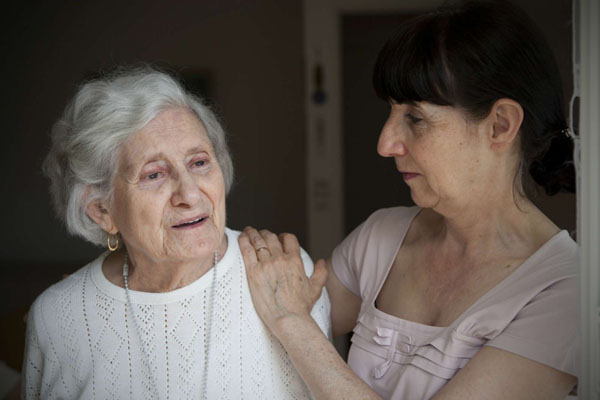Alzheimer's Disease: What to expect in Late Stage
23 June 2018
The late stages of Alzheimer’s disease can be difficult for the patient, family, and caregivers. It’s important to know the symptoms, understand the progression of the disease, and provide appropriate care. As always, it is best to speak with a medical professional before taking action, but knowing what to expect can help you be prepared.

How Long Does Late Stage Alzheimer’s Last?
Unfortunately, there is no clear answer for Alzheimer’s disease and life span. Factors that come into play are the types of Alzheimer’s a person is diagnosed with and their age, overall health, and ability to perform daily tasks. Some studies show the average life expectancy to be about 8.3 years when diagnosed at age 65, but this should only be used as a ballpark figure. After all, some people can live 20 years or more after they begin showing symptoms. The life expectancy of late stage alzheimer’s disease can last from a few weeks to a several years.
Late Stage Alzheimer’s Symptoms
While the early signs of Alzheimer’s disease involve such things as forgetting recent events or misplacing certain items, Alzheimer’s symptoms in later stages may include the following:
- Inability to communicate coherently
- Loss of physical abilities such as walking or sitting
- Loss of control of bowel function and bladder
- Increase in infections such as pneumonia
- Inability to control basic functions, such as swallowing or holding head up
- Requirement of assistance with daily tasks, such as eating, going to the bathroom, getting dressed, and other self-care tasks
- Late stage Alzheimer’s symptoms can also include changes in sleep patterns, weight loss, and sometimes seizures
Late Stage Alzheimer’s and Sleeping
Sleep disturbances are not uncommon among older adults, but they tend to be more frequent among those with Alzheimer’s disease. Studies show that people with dementia tend to be awake for longer periods of time and will often wander, call out, and be unable to lie still. Furthermore, many people with Alzheimer’s will take naps during the day and may experience sundowning. Sundowning is increased agitation during the late afternoon and early evening. Those with Alzheimer’s also experience intense disorientation due to sleep. This can include misinterpreting what they see due to reduced lighting, increased shadows, and the inability to distinguish dreams from reality.
It’s always best to seek help from a medical professional regarding sleep issues, but here are a few things you can do to help out:
- Seek morning sunlight exposure
- Maintain regular mealtimes and bedtimes
- Encourage daily exercise no more than four hours before bedtime
- Treat any outside pain, such as sore body parts or uncomfortable sleep conditions
- Use the bed only for sleep and discourage watching TV in bed
- Avoid alcohol, caffeine, and nicotine
Weight Loss and Late Stage Alzheimer’s
Many people experience weight loss during late stage Alzheimer’s disease due to difficulties chewing, swallowing, and performing basic motor functions.
To support a person with Alzheimer’s you can help out by doing the following:
- Put food or drink into their hand if they are struggling
- With approval from a medical professional, alter the consistency of food for them by changing meals into liquid or puree form
- Allow them to see their food easier by choosing a plate that’s a different color than the food
- Provide them with healthy meals they enjoy, as their tastes for different types of food may change with age or as Alzheimer’s progresses
- Think about their oral health as this will affect their ability to communicate and eat properly
Alzheimer’s Seizures in Later Stages?
According to medical research up to 26% of those with Alzheimer’s will experience some form of seizure. Seizures can be difficult to diagnose among Alzheimer’s patients since the symptoms often mimic the disease, itself. An Alzheimer’s patient may require input from an epileptologist for an official diagnosis.
Speak to a doctor if you see any of the following symptoms:
- Infrequent bedwetting
- Sudden twitching and blinking
- Fluctuations in mental status
- Alzheimer’s is a difficult disease to manage in the late stages. As it progresses, each individual will encounter different symptoms and events. It’s best to prepare yourself for all possibilities and to know how to handle them if they occur
Residential Care Guide
Eligibility and AssessmentNew Aged Care Homes
Residential Care Financials
- Residential Care Fee Categories
- Current Fees and Charges
- Basic Daily Care Fee
- Means Tested Care Fee
- What is a RAD, DAP, MPIR?
- Current and Historical MPIR's
- Refundable Accommodation Deposit (RAD)
- Daily Accommodation Payment (DAP)
- Maximum Permissible Interest Rate (MPIR)
- Additional Service Fee (ASF)
Centrelink Form SA485 Explained
Centrelink Form SA457 Explained
Residential Care Agreement
Age Pension Current Rates